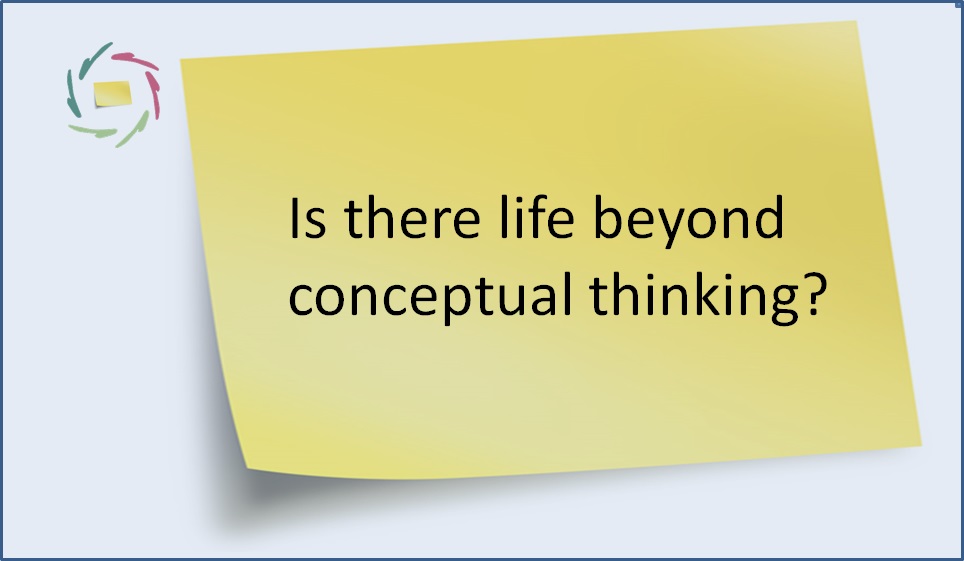46. Is there life beyond conceptual thinking?

Here’s the picture. On the one hand, we think with or by way of concepts. A concept can be anything like <tree>, <grandmother>, <character>. It is not ‘this tree’ but <tree>. The concept of <tree> can be filled in by any specific tree (called then an ‘instance’ of the concept). The concept of ‘tree’ has characteristics that one can use to decide whether anything one sees is indeed a tree, or not. Concepts are in most cases regarded as clear-cut. They have necessary characteristics and can be related to other concepts in clear ways. As you may guess, these relationships themselves can also be instances of relationship-concepts. Mind in this view is a huge network of concepts and relationships.
◊◊◊
- But if there is one hand, there is also another hand. We can start here from the brain itself. Where do we find the concepts of our thinking in the physical brain? The answer is: nowhere. There is no cell, nor group of cells that is specifically holding the concept of <grandmother>. Therefore, and happily so, <grandmother> doesn’t suddenly and exclusively disappear from your mind when perchance you lose some specific neurons. This never happens, because <grandmother> has no place in the brain, but only appears through the functioning of the brain.
◊◊◊
Brain and mind. How do they relate? Many books have been written about the subject and many more will be. My special interest in this is: what about the ‘deeper mind’? Does it reside in another brain (or brain-half) as the mind that I described on the one hand? Or is it in all cases a go-between between this kind of more conceptual mind and brain? Or is it a mixture?
◊◊◊
If we look at nature in general, then almost certainly it is the last of these options. Nature likes to mix things up. This makes its products less efficient, but more robust. If something changes or breaks down, very likely there is something else that can take its place, at least enough so for the individual to survive and procreate… Yeah, sometimes one has to look for arguments far from home. Or is it?
◊◊◊
In this mixture however, I see a very large part for the deeper mind being present between brain and the on-the-one-hand-mind. In deeper mind, there are concepts too, but also things that are more alike how the brain works. This is: primarily with concept-less patterns and associations. Is this vague to you? Indeed it is. It is vague by nature. It is vague because nature wanted it so. The animal kingdom and in the end human species has developed more and more rigorous conceptual thinking. But this wasn’t done by wiping out sub-conceptual thinking. On the contrary, nature was possibly only capable of accomplishing this by a big increase of sub-conceptual thinking.
◊◊◊
In other words: the deeper mind is there, alive and kicking. Not only is it there sometimes, but all the time. Moreover, the deeper mind is necessary for us to be able to think conceptually. Or one can say: conceptual thinking emerges from deeper mind. Deeper mind is more like what we can think of as being ‘life’ itself.
◊◊◊
So is there life beyond conceptual thinking? Yes. I would even say that there is no conceptual thinking beyond life itself. Life, by way of deeper mind, pervades it in all aspects.
◊◊◊
And doesn’t it make mind infinitely much more interesting?
◊◊◊


